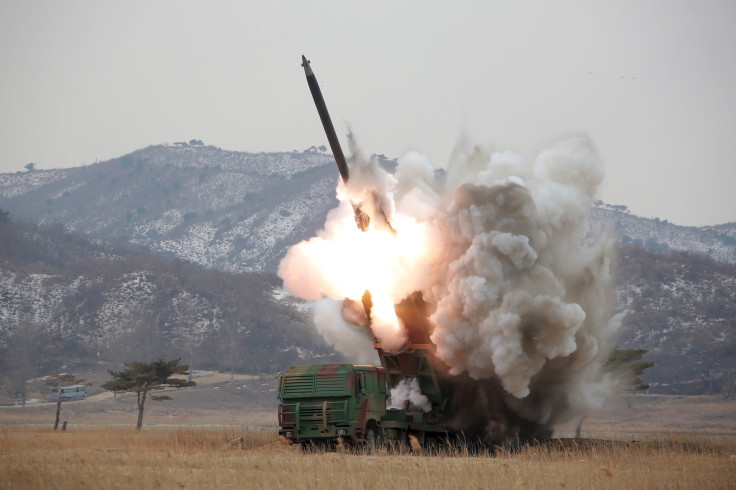UN-North Korea Nuclear Sanctions Draw Attention To Pyongyang’s China Relationship

One day after the United Nations Security Council adopted tough new resolutions against North Korea, the reclusive Kim Jong Un regime reacted by ordering its nuclear forces Thursday evening to prepare for an imminent launch. The provocative move by Pyongyang, which came days after it launched short-range missiles off its east coast, suggests it will continue to thumb its nose at the world's superpowers, and calls into question whether the hermit kingdom's traditional ally, China, is able or willing to enforce the new sanctions, North Korea and China analysts said.
“We’ve seen how the latest U.N. resolution reflects China’s anger at its troublesome ally,” said Bruce Klingner, senior research fellow in Korean and Japanese affairs at the Heritage Foundation, a conservative Washington think tank. “That said, all the measures that came out [Wednesday] could have been implemented with any of the previous resolutions years ago had China not been so obstructionist, and to that end, China and Russia did actually water down the measures that were eventually released.”
While China has been an ally of North Korea’s for decades, Pyongyang’s continual defiance of U.N. sanctions that have piled up over the course of more than 20 years has caused consternation in Beijing. In the immediate aftermath of an underground nuclear weapons test in the northeast of North Korea in January and a missile test in February, China called for Pyongyang to “fulfill its promise of denuclearization and stop any actions that would worsen the situation” before Beijing began intense negotiations with the U.S. on the sanctions resolution.
A rough draft of the sanctions that passed Wednesday called for targeted economic punishments of certain North Korean officials, the inspection of cargo ships arriving and leaving the country, and a ban on some types of trade. U.S. Secretary of State John Kerry called the sanctions the toughest in 20 years.
China is also expected to increase security along its porous Korean border, where technology has been smuggled across to assist in the regime’s missile program. Shutting down the border entirely, however, would cut off a lifeline for North Korea's impoverished population outside of the capital, potentially depriving millions of food and vital supplies.
Nonetheless, the limits on commerce are likely to undermine the strong trade relationship between the two countries, which accounts for 70 percent of North Korea’s total exports, according to a U.S. Congressional Research Service report from January. Banning China from buying coal, iron ore and rare earth materials from the Kim Jong Un regime could shrink the isolated nation's economy, exacerbating the longstanding humanitarian crisis in the country.
North Korea's nukes "need to be ready for use at any time," says Kim Jong Un: https://t.co/vDNbpNKUl8 pic.twitter.com/P0DsDDz34I
— CNN (@CNN) March 4, 2016
Both Russia and China supported the sanctions but said any resolution passed by the Security Council should not bring further pain to North Korean citizens. That means that the border will likely be less stringently monitored than the West had hoped.
In spite of these concerns, China had already started to implement the new U.N. resolution.
“There were some reports that Chinese banks on the border city of Dandong have already begun suspending the transfer of Chinese currency to North Korean banks, so that’s something that might indicate China’s willingness to enforce some of these measures initially,” said Lisa Collins, a fellow with the Korea Chair at the Center for Strategic and International Studies in Washington. “But there’s always a chance that China could change its mind as it has done in the past."
Much of the skepticism that China is unwilling to enforce sanctions comes from the suspicion that the Communist states remain allies despite China's uneasiness with the autocratic leadership, explained Klingner. "Even during the heyday of Kim Il Sung, when relations were pretty good, he played China and the Soviet Union off against each other, often accusing China of straying from the true socialistic Communist path, and was very critical of Beijing at times," Klingner said.
However, Klingner said relations between Beijing and Pyongyang are now at an all-time low, with Kim believing his nuclear weapons program offers a certain amount of independence from his vastly more powerful neighbor.
"China's overriding priority appears to be to prevent a collapse of North Korea," noted January's congressional report, adding that Beijing feared the destabilizing effects of a humanitarian crisis, the possibility of refugees flowing across its borders, and the uncertainty of how the United States and other powers would assert themselves on the peninsula in the event of a power vacuum.
The official state of war between North and South Korea over the past 65 years has allowed the U.S. to gain a strong and significant military foothold in the region, which China sees as limiting its own ambitions to be a true regional superpower. The new sanctions represent an opportunity for China to increase its influence and begin to bring North Korea out of isolation.
“For now, China seems to hold all the cards in determining how North Korea will act," said Lawrence Ward, a partner at the international law firm Dorsey & Whitney who works in U.S. national security law, international trade compliance law and licensing. "If China enforces the U.N. sanctions, undoubtedly it will be more and more difficult for North Korea to continue in its isolation. If China largely ignores the U.N. sanctions, change will be slow."
© Copyright IBTimes 2024. All rights reserved.












